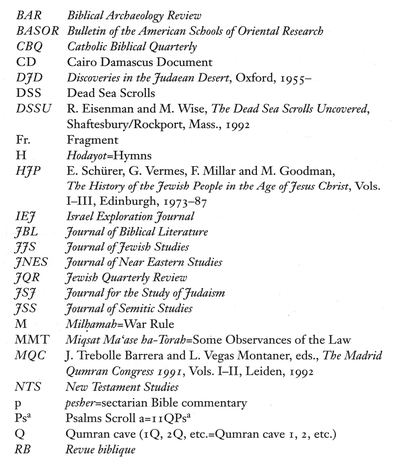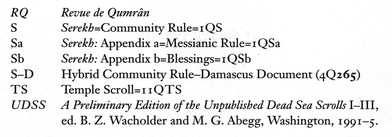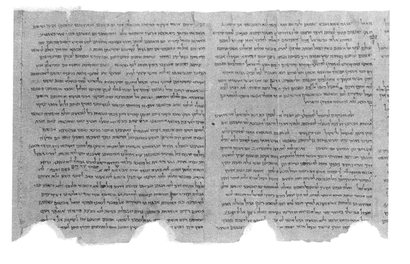The Complete Dead Sea Scrolls in English (17 page)
Read The Complete Dead Sea Scrolls in English Online
Authors: Geza Vermes

BOOK: The Complete Dead Sea Scrolls in English
11.75Mb size Format: txt, pdf, ePub
List of Abbreviations


Note on This Translation
The purpose of this translation is to enable the reader to come into direct contact with the literary works found at Qumran. The English does not follow slavishly the Hebrew and Aramaic originals but aims at being faithful, intelligible and as far as possible readable. For this reason the Hebrew word order had to be altered and the numbering of the English lines, which often did not correspond to those of the manuscript, had to be sacrificed. However, since the 1995 fourth Penguin edition, every fifth line of the manuscript has been indicated in the margin of the translation.
As stated in the preface, only meaningful texts are included in this volume, with the occasional exception of some broken lines which nevertheless reveal important information. When the same writing is extant in several manuscripts, the translation either represents a composite text, or indicates significant variants, but identical passages are not normally repeated. Experts are referred to the
DJD
volumes.
DJD
volumes.
Lacunae impossible to complete with any measure of confidence are indicated by dots in the translation. Texts supplied from a different manuscript of the same document appear between { }. Hypothetical but likely reconstructions are placed between [ ] and glosses necessary for fluency between ( ). Biblical quotations appearing in the text are printed in italics, as well as the titles and headings which figure in the manuscripts. Each scroll is divided into columns. The beginning of each of these columns is indicated in the translation by bold Roman numerals:
I, II, III,
etc. The word
vacat
indicates an empty space in the manuscript.
I, II, III,
etc. The word
vacat
indicates an empty space in the manuscript.
Finally, I wish to acknowledge here the considerable debt we all owe to J. T. Milik and J. Strugnell for their pioneering decipherment of many of the Cave 4 texts.
A. The Rules

âThe Manual of Discipline',
Israel Museum, Jerusalem
Israel Museum, Jerusalem
The Community Rule
(IQS, 4Q
255-64
, 4Q
280
,
286-7
, 4Q
502
, 5Q
II, 13
)
255-64
, 4Q
280
,
286-7
, 4Q
502
, 5Q
II, 13
)
Discovered in Cave I, the eleven relatively well-preserved columns of this manuscript (IQS) were first published in 1951 by M. Burrows under the title
The Manual of Discipline (The Dead Sea Scrolls of St Mark's Monastery,
II, New Haven). Important fragments of ten other manuscripts of the Rule containing a certain number of variant readings were also found in Cave 4 (4QS
a-j
= 4Q
255-64
), and two small fragments in Cave 5(5Q
11
=1QS II, 4-7 and
13
quoting 1QS III, 4-5 and II, 19). Other citations of the Community Rule, especially the penal code from 1QS VII, may be found in the 4Q fragments of the Damascus Document (cf. 4Q
266
, fr. 10 and
270
, fr. 7) and in the hybrid S-D (4Q
265
). The latter quotes also from 1QS IV, VI and VIII, Finally, 4Q502, fr. 16 includes a quotation from 1QS IV, 4-6. See also 11Q
29
in
DJD,
XXIII, 433-4, quoting 1QS VII, 23.
The Manual of Discipline (The Dead Sea Scrolls of St Mark's Monastery,
II, New Haven). Important fragments of ten other manuscripts of the Rule containing a certain number of variant readings were also found in Cave 4 (4QS
a-j
= 4Q
255-64
), and two small fragments in Cave 5(5Q
11
=1QS II, 4-7 and
13
quoting 1QS III, 4-5 and II, 19). Other citations of the Community Rule, especially the penal code from 1QS VII, may be found in the 4Q fragments of the Damascus Document (cf. 4Q
266
, fr. 10 and
270
, fr. 7) and in the hybrid S-D (4Q
265
). The latter quotes also from 1QS IV, VI and VIII, Finally, 4Q502, fr. 16 includes a quotation from 1QS IV, 4-6. See also 11Q
29
in
DJD,
XXIII, 433-4, quoting 1QS VII, 23.
The 1Q manuscript bears the stamp of editorial modification. For instance, in column x the original âI will
conceal
knowledge with discretion' is corrected to âI will
impart
knowledge with discretion'. The section covered by columns VIII-IX was particularly subjected to alteration as indicated by corrections and interlinear additions in 1QS, but remarkably none of these appears in the 4QS manuscripts. The same section is considerably abridged in 4QS
e
=4Q
259
, where the text jumps from 1QS VIII, 15 directly to ix, 12.
conceal
knowledge with discretion' is corrected to âI will
impart
knowledge with discretion'. The section covered by columns VIII-IX was particularly subjected to alteration as indicated by corrections and interlinear additions in 1QS, but remarkably none of these appears in the 4QS manuscripts. The same section is considerably abridged in 4QS
e
=4Q
259
, where the text jumps from 1QS VIII, 15 directly to ix, 12.
The Community Rule is probably one of the oldest documents of the sect; its composition may have originated around 100 BCE, and the Cave I copy itself is said to have been produced during the quarter of a century following that date. It seems to have been intended for the Community's teachers, for its Masters or Guardians, and contains extracts from liturgical ceremonies, an outline of a tractate on the spirits of truth and falsehood, statutes concerned with initiation into the sect and with its common life, organization and discipline, a penal code, and finally a poetic dissertation on the fundamental religious duties of the Master and his disciples, and on the sacred seasons proper to the Community.
Literary analysis suggests that the main document begins at 1QS v, 1. This is where 4QS
d
(=4Q
258
) starts. The preceding columns in 1QS I-IV prefix to the Rule proper a liturgical text (1QS 1, I-III, 11) and the probably independent tractate on the two spirits (1QS III, 12-IV, 25). Among the 4Q manuscripts only 4QS
b
(=4Q256) contains remnants of all the sections of 1QS. The other documents represent either 1QS I-IV or 1QS V-XI. 4QS
e
(4Q259) substitutes, it seems, the text of 4QOtot (4Q319) for that of 1QS X-XI.
d
(=4Q
258
) starts. The preceding columns in 1QS I-IV prefix to the Rule proper a liturgical text (1QS 1, I-III, 11) and the probably independent tractate on the two spirits (1QS III, 12-IV, 25). Among the 4Q manuscripts only 4QS
b
(=4Q256) contains remnants of all the sections of 1QS. The other documents represent either 1QS I-IV or 1QS V-XI. 4QS
e
(4Q259) substitutes, it seems, the text of 4QOtot (4Q319) for that of 1QS X-XI.
There are, to my knowledge, no writings in ancient Jewish sources parallel to the Community Rule, but a similar type of literature flourished among Christians between the second and fourth centuries, the so-called âChurch Orders' represented by works such as the Didache, the Didascalia, the Apostolic Constitution.
The contents of 1QS may be divided into three main sections, but further subheadings appear in the text itself:
1. Entry into the Covenant, followed by an instruction on the two spirits (I-IV).
2. Statutes relating to the Council of the Community (V-IX).
3. Directives addressed to the Master, and the Master's Hymn (IX-XI).
Some of the variant readings appearing in the Cave 4 manuscripts have been adopted in this translation, but the significantly different texts of 4QS
d
(4Q258) and 4QS
e
(4Q259) will be appended to 1QS.
d
(4Q258) and 4QS
e
(4Q259) will be appended to 1QS.
For the
editio princeps
of 1QS, see M. Burrows et
al., The Dead Sea Scrolls of St Mark's Monastery Vol.II, Fasc. 2:Plates and transcription of the Manual of Discipline,
1951. Cf. also J. H. Charlesworth
et al.,
eds.,
The Dead Sea Scrolls Vol. I: Rule of the Community and Related Documents,
1994, 1-51. S. Metso,
The Textual Development of the Qumran Community Rule
(1997).
1QSeditio princeps
of 1QS, see M. Burrows et
al., The Dead Sea Scrolls of St Mark's Monastery Vol.II, Fasc. 2:Plates and transcription of the Manual of Discipline,
1951. Cf. also J. H. Charlesworth
et al.,
eds.,
The Dead Sea Scrolls Vol. I: Rule of the Community and Related Documents,
1994, 1-51. S. Metso,
The Textual Development of the Qumran Community Rule
(1997).
I [The Master shall teach the sai]nts to live(?) {according to the Book} (4Q255, 257) of the Community [Rul]e, that they may seek God with a whole heart and soul, and do what is good and right before Him as He commanded by the hand of Moses and all His servants the Prophets; that they may love all that He has chosen and hate all that He has rejected; that they may abstain from all evil and hold fast to all good; that they may practise truth, righteousness, and justice upon earth and no longer stubbornly follow a sinful heart and lustful eyes, committing all manner of evil. He shall admit into the Covenant of Grace all those who have freely devoted themselves to the observance of God's precepts, that they may be joined to the counsel of God and may live perfectly before Him in accordance with all that has been revealed concerning their appointed times, and that they may love all the sons of light, each according to his lot in God's design, and hate all the sons of darkness, each according to his guilt in God's vengeance.
All those who freely devote themselves to His truth shall bring all their knowledge, powers and possessions into the Community of God, that they may purify their knowledge in the truth of God's precepts and order their powers according to His ways of perfection and all their possessions according to His righteous counsel. They shall not depart from any command of God concerning their times; they shall be neither early nor late for any of their appointed times, they shall stray neither to the right nor to the left of any of His true precepts. All those who embrace the Community Rule shall enter into the Covenant before God to obey all His commandments so that they may not abandon Him during the dominion of Belial because of fear or terror or affliction.
On entering the Covenant, the Priests and Levites shall bless the God of salvation and all His faithfulness, and all those entering the Covenant shall say after them, âAmen, Amen!'
Then the Priests shall recite the favours of God manifested in His mighty deeds and shall declare all His merciful grace to Israel, and the Levites shall recite the iniquities of the children of Israel, all their guilty rebellions and sins during the dominion of Belial. And after them, all those entering the Covenant shall confess and say: âWe have strayed! We have [disobeyed!] We and our fathers before us have sinned and acted wickedly in walking [counter to the precepts] of truth and righteousness. [And God has] judged us and our fathers also;
II
but He has bestowed His bountiful mercy on us from everlasting to everlasting.' And the Priests shall bless all the men of the lot of God who walk perfectly in all His ways, saying: âMay He bless you with all good and preserve you from all evil! May He lighten your heart with life-giving wisdom and grant you eternal knowledge! May He raise His merciful face towards you for everlasting bliss!'
II
but He has bestowed His bountiful mercy on us from everlasting to everlasting.' And the Priests shall bless all the men of the lot of God who walk perfectly in all His ways, saying: âMay He bless you with all good and preserve you from all evil! May He lighten your heart with life-giving wisdom and grant you eternal knowledge! May He raise His merciful face towards you for everlasting bliss!'
And the Levites shall curse all the men of the lot of Belial, saying: âBe cursed because of all your guilty wickedness! May He deliver you up for torture at the hands of the vengeful Avengers! May He visit you with destruction by the hand of all the Wreakers of Revenge! Be cursed without mercy because of
(4Q256)
the darkness of your deeds! Be damned in the shadowy place of everlasting fire! May God not heed when you call on Him, nor pardon you by blotting out your sin! May He raise His angry face towards you for vengeance! May there be no “Peace” for you in the mouth of those who hold fast to the Fathers!' And after the blessing and the cursing, all those entering the Covenant shall say, âAmen, Amen!'
(4Q256)
the darkness of your deeds! Be damned in the shadowy place of everlasting fire! May God not heed when you call on Him, nor pardon you by blotting out your sin! May He raise His angry face towards you for vengeance! May there be no “Peace” for you in the mouth of those who hold fast to the Fathers!' And after the blessing and the cursing, all those entering the Covenant shall say, âAmen, Amen!'
And the Priests and Levites shall continue, saying: âCursed be the man who enters this Covenant while walking among the idols of his heart, who sets up before himself his stumbling-block of sin so that he may backslide! Hearing the words of this Covenant, he blesses himself in his heart and says, “Peace be with me, even though I walk in the stubbornness of my heart” (Deut. xxix, 18-19), whereas his spirit, parched (for lack of truth) and watered (with lies), shall be destroyed without pardon. God's wrath and His zeal for His precepts shall consume him in everlasting destruction. All the curses of the Covenant shall cling to him and God will set him apart for evil. He shall be cut off from the midst of all the sons of light, and because he has turned aside from God on account of his idols and his stumbling-block of sin, his lot shall be among those who are cursed for ever.' And after them, all those entering the Covenant shall answer and say, âAmen, Amen!'
Thus shall they do, year by year, for as long as the dominion of Belial endures. The Priests shall enter first, ranked one after another according to the perfection of their spirit; then the Levites; and thirdly, all the people one after another in their Thousands, Hundreds, Fifties, and Tens, that every Israelite may know his place in the Community of God according to the everlasting design. No man shall move down from his place nor move up from his allotted position. For according to the holy design, they shall all of them be in a Community of truth and virtuous humility, of loving-kindness and good intent one towards the other, and (they shall all of them be) sons of the everlasting Company.
Other books
The Book of Taltos by Steven Brust
To Catch His Mate (Crescent Moon Series Book 5) by Savannah Stuart, Katie Reus
Tribes by Arthur Slade
Five by Ursula P Archer
Something True by Karelia Stetz-Waters
Maps and Legends by Michael Chabon
El ojo de Eva by Karin Fossum
Shattered Vows by Carol Townend
Even Hell Has Knights (Hellsong) by McCoy, Shaun O.
Need Me - Being Trevor's Toy by Charlotte DeCorte
